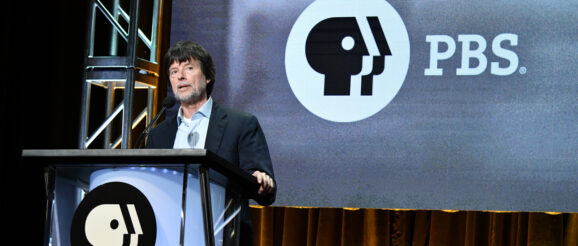Ken Burns is ready to fight for public broadcasting


Ken Burns speaks during the PBS segment of the Summer 2019 Television Critics Association Press Tour.
Amy Sussman/Getty Images
Filmmaker Ken Burns called the elimination of federal funding for public broadcasting shortsighted, warning that the cuts will be catastrophic for new filmmakers and rural communities. He calls it a profound blow to what he says is a uniquely American institution.
“The Corporation for Public Broadcasting (CPB) and another agency that has felt the axe, the National Endowment for the Humanities, have been central to my origin story,” Burns told Morning Edition. “I wouldn’t have been able to make any of the films without their support.”
That early support, he said, helped attract foundations and underwriters that made it possible to complete films like Brooklyn Bridge, Huey Long and the sixth film in The Civil War series. Even today, the CPB represents up to 25% of the funds for his projects, Burns said.
“I’m less concerned with our ability to recover because we’ll just redouble the efforts,” Burns said. “But the effect down the system, for filmmakers, is going to be catastrophic.”
President Trump and most congressional Republicans contend that public media is biased and does not need federal funding. The House vote split largely along party lines – 216-to-213 – with two Republicans joining Democrats in opposition. The bill is headed to Trump’s desk for his signature.
Burns said the damage will be especially severe in rural areas, where local stations may be the only source of news, educational programming and emergency alerts.
He described public broadcasting as a completely homegrown American institution that’s unique among publicly funded broadcasters around the world.
“Public broadcasting is the Declaration of Independence applied to communications,” he said. “It’s that central to our definition.”
He added that while streaming services might have offered him more money or faster timelines, they could never offer the same editorial and creative freedom. His Vietnam War documentary took 10 and a half years and cost $30 million to make. “None of those other places would have given me ten and a half years,” he said. “They want it in a year or a year and a half, and it would not have been the same film.”
Burns also rejected the argument that public media has outlived its purpose in the age of the internet. “We found out how unhealthy the internet is,” he said. “We’re looking for an organization that is obligated to seek facts. Public broadcasting delivers with the highest standards of journalism and the highest standards of artistic achievement.”
The following interview has been lightly edited for length and clarity.
Interview Highlights
The damage will be done most significantly in rural areas where they take our superb primetime schedule and our children’s programming, but also have continuing education and classroom of the air and homeland security and alerts, emergency alerts, that are hugely important. They’re sometimes the only local news in that area. And I sort of think that public broadcasting is the Declaration of Independence applied to communications. It’s that central to our definition. It’s such a purely American expression, unlike any of the other governmental broadcasters around the world. This is a bottom up, completely homegrown American institution. And you can tell just by the way, I’ve been speaking with congressmen around the country, they know, even though they voted for rescission, that this is going to be very unpopular.
I think most broadcast television, its skywriting disappears with the first Zephyr. I’m pleased to tell you that if this was a school day in America, hundreds of classrooms would be playing various films that we’ve made, some of them 35 years old, like our Civil War series. And that’s a testament to the staying power, not just for a general audience, not just for the continuing education of adults, but most importantly for our children as they go and struggle and ask fundamental questions about who we are. What is the nature of the United States? Where did we come from? What struggles and conflicts made us who we are?
The digital piece was written by Majd Al-Waheidi and edited by Lisa Thomson. Destinee Adams contributed.
